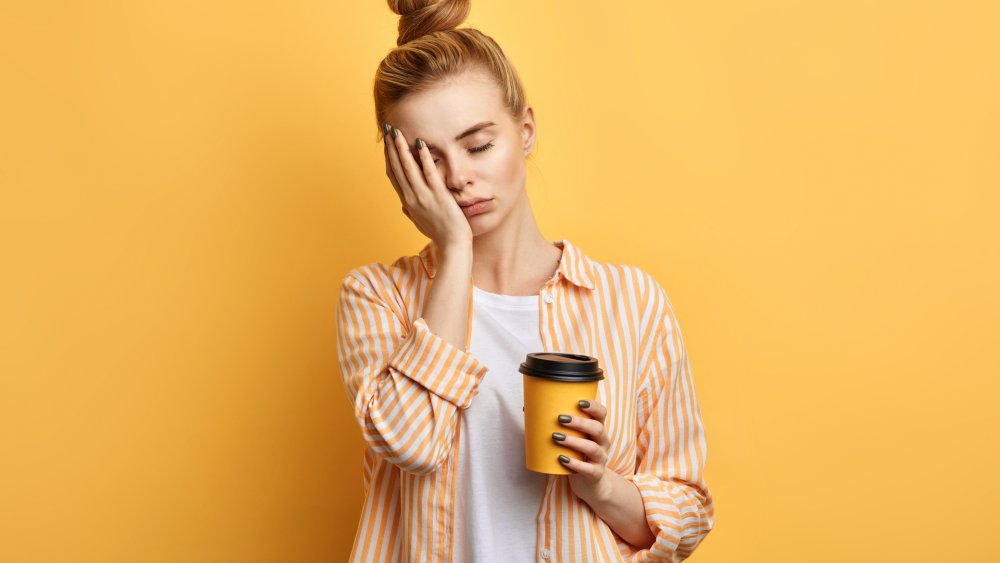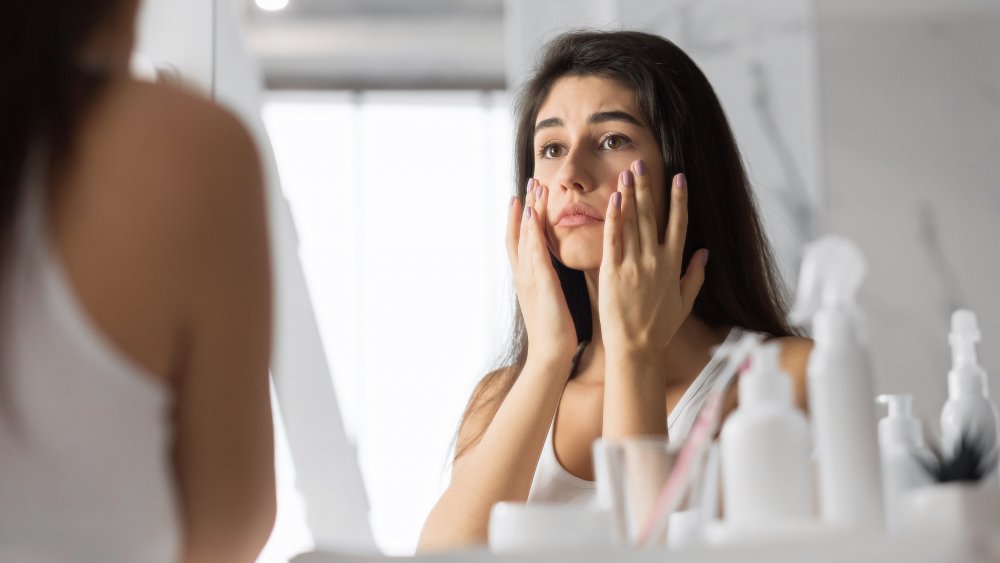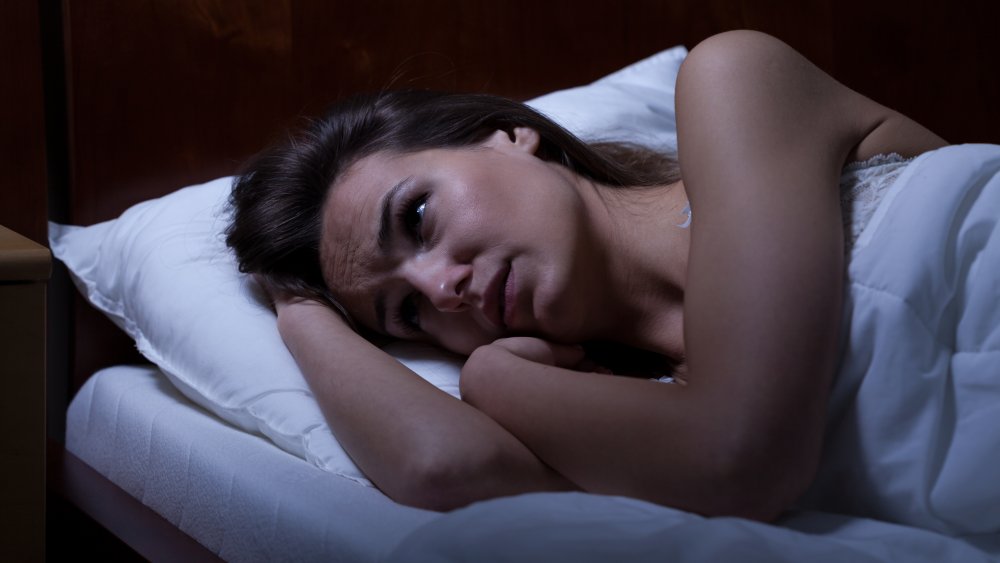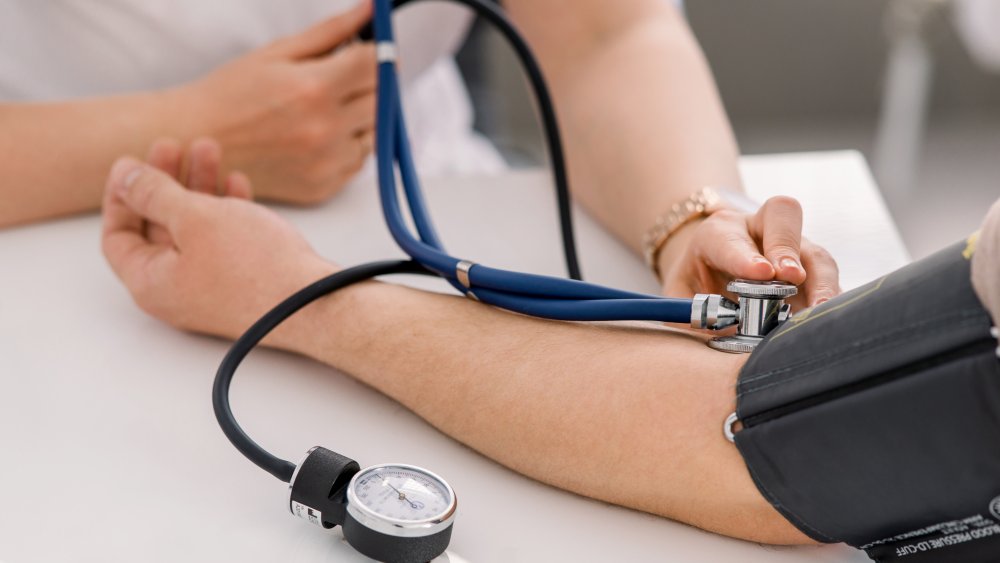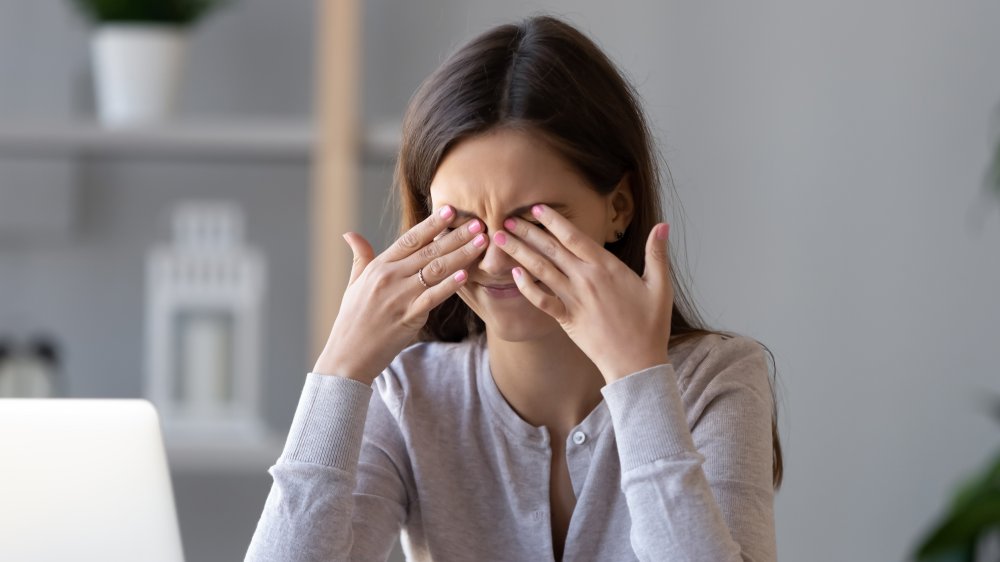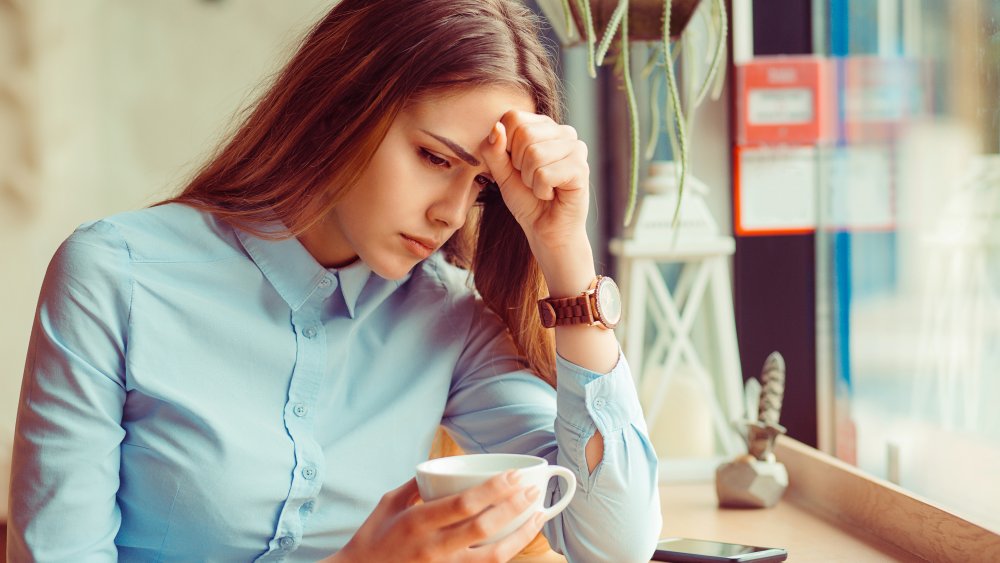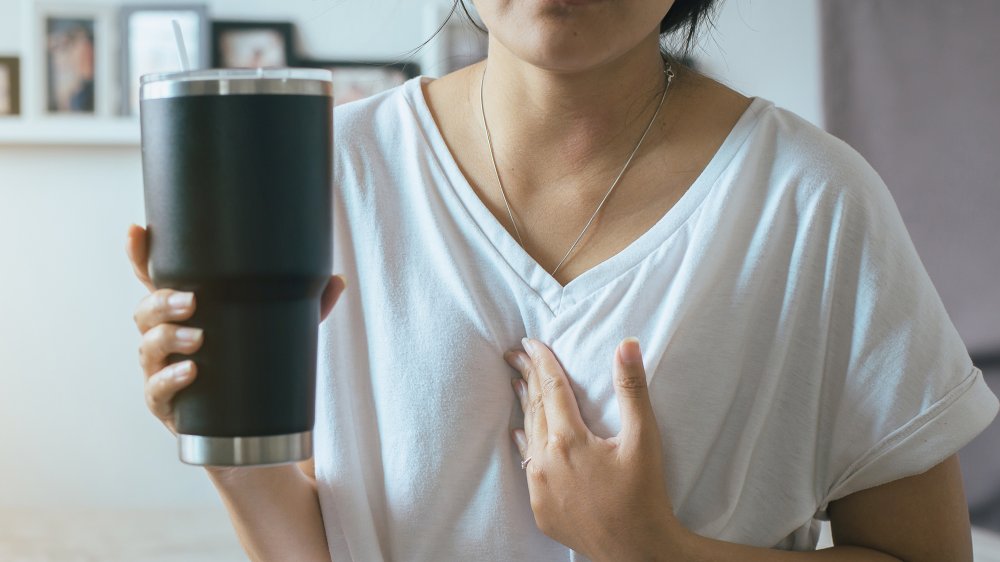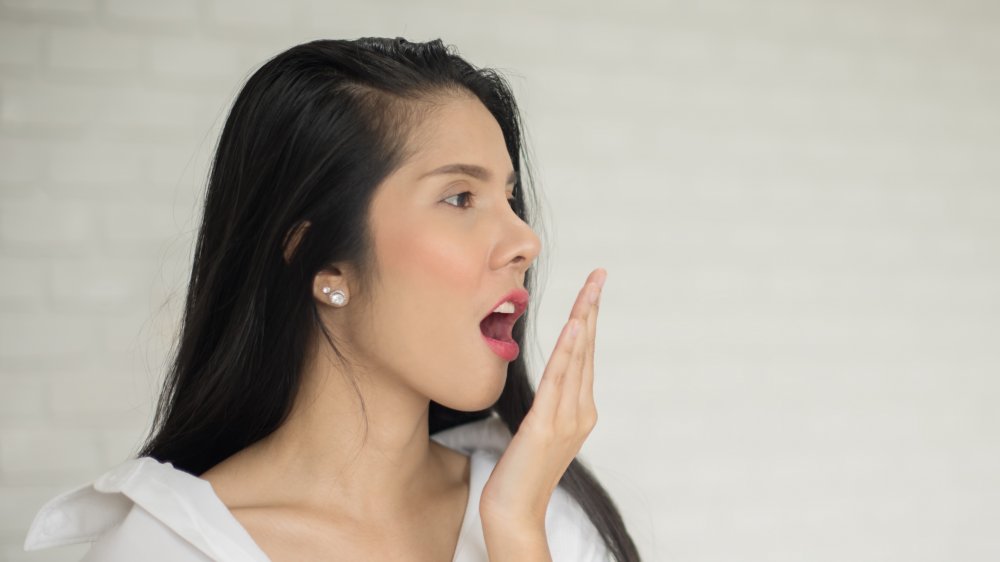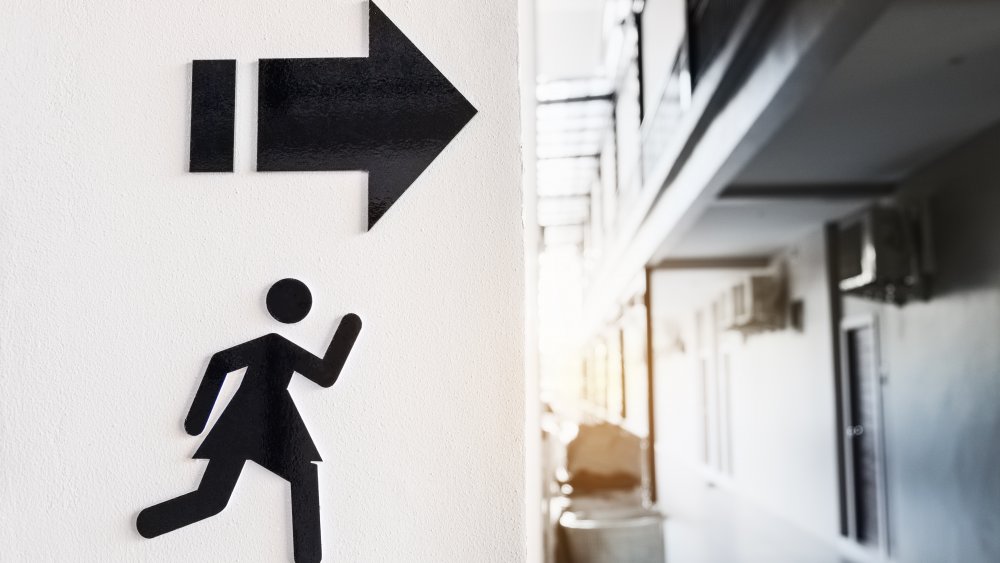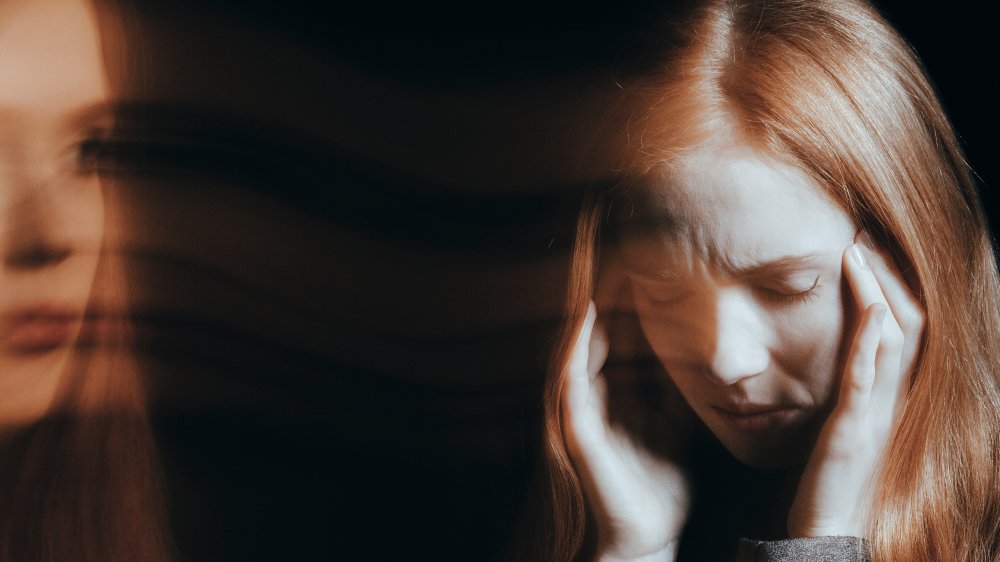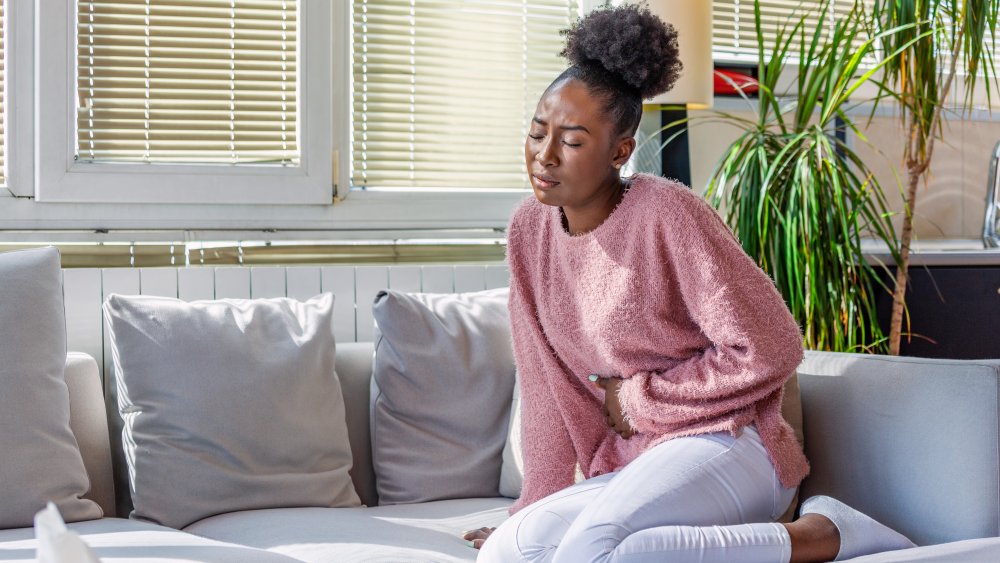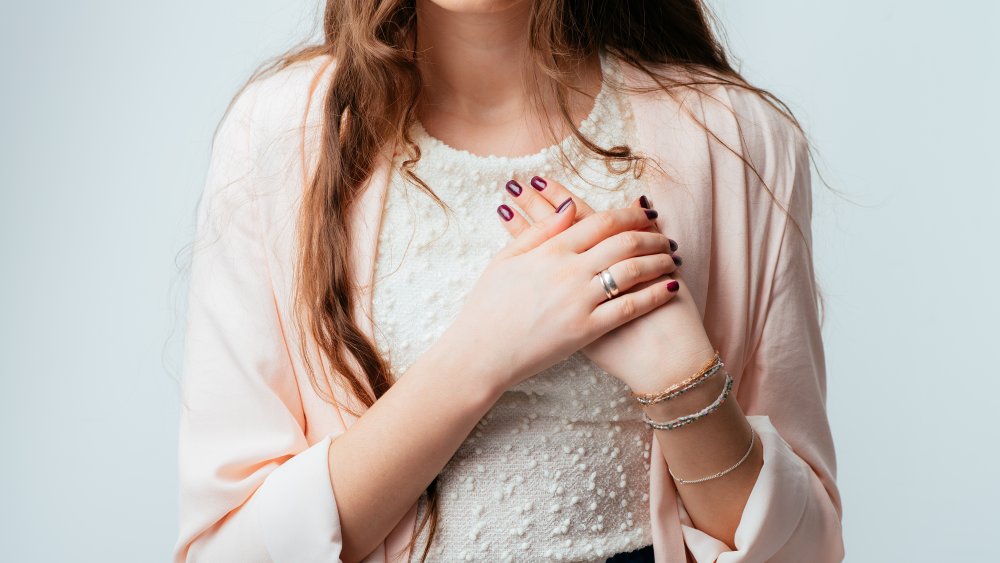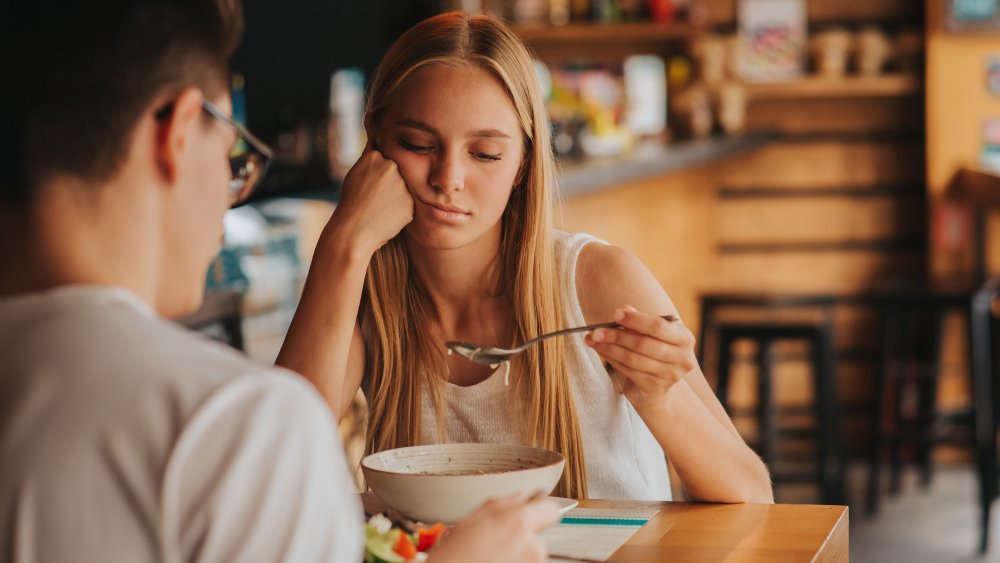You're Drinking Too Much Caffeine If This Happens To Your Body
For some, caffeine is everything. Whether you're a stay-at-home mom or a busy businessperson, the kick it gives probably keeps you going. "Basically, caffeine stimulates your central nervous system, making you feel more awake and alert," Dr. Esteban Kosak, medical advisor and physician, told Health Digest. It's no wonder so many of us depend on it to get through the day.
However, too much of this good thing can actually be a bad thing. The FDA recommends keeping our caffeine intake under 400 milligrams each day, though there some people should put down their cup even sooner. This is because our bodies all respond to caffeine differently. How much coffee you should have on any given day depends on the medications you take, foods you eat, and even your metabolism. "People should keep in mind that caffeine is a drug and can have consequences on multiple levels if overused," Dr.Thomas Pitts, board-certified neurologist, cautioned in an interview with Health Digest.
Before you decide to pick up a second cup of joe — or third or fourth or fifth — there may be a few signs telling you to stop. Here's a look at what happens to your body if you're drinking too much caffeine.
You may be drinking too much caffeine if your skin begins to prematurely age
In a world where nearly everyone is yearning for a more youthful appearance, giving up caffeine could be the greatest solution. Yes, it turns out that your coffee could be at least partially to blame for prematurely aged skin.
While you regularly depend on caffeine to keep you alert and energized, drinking too much of this stuff can have the opposite effect on your appearance. As soon as you start drinking it, caffeine begins cutting down on your skin's production of collagen. "Collagen gives the skin tightness and elasticity that is responsible for keeping its youthful and vibrant appearance," registered dietitian Trista Best explained to Health Digest.
When you have less collagen, you get more wrinkles. Obviously, this is expected as we age, but not when we're simply relying on caffeine to keep us going. While you may not be ready to give up your lattes just yet, you may want to consider reducing your consumption. "Cutting back on coffee is one way to prevent this decrease in collagen and improve skin's appearance," Best said.
Drinking too much caffeine during the day can keep you up at night
Caffeine is great at keeping us up during the day, but energized is not exactly how we want to feel when we should be winding down for bed each night. Unfortunately, "overconsumption of caffeine may cause insomnia even in those with no history of this condition," Dr. Andrea Paul, physician and medical advisor to Illuminate Labs, explained exclusively to Health Digest.
One study published in the Journal of Clinical Sleep Medicine in 2013 found that enjoying caffeine six hours before bedtime can make falling asleep take twice as long. This means you'll be laying in bed for about 45 minutes before you drift off.
The effects can be felt after waking up too. "It may negatively impact the body's circadian rhythm for the duration of the day," Paul explained. Luckily for us, this loss of sleep isn't a permanent problem. Cutting back on caffeine can help you hit the sack more successfully.
Is your blood pressure spiking? You're probably drinking too much caffeine
If you suddenly find that your blood pressure has spiked, it could be a sign that you need to cut back on your caffeine intake. Various studies have been performed to discover a link between our favorite caffeinated drinks and high blood pressure. However, according to the Mayo Clinic, experts still aren't exactly sure why caffeine causes this to happen. All we know is that it is a side effect among some caffeine enthusiasts.
That's not to say there aren't possible theories floating around out there, though. It could be because caffeine blocks a specific hormone in our bodies that helps our arteries widen. It could also be because our bodies begin to release more adrenaline when we drink caffeine, which can cause the blood pressure to rise.
Either way, "with high blood pressure comes the increased risk of heart attack and stroke," Dr. Lina Velikova, immunologist and medical writer, warned Health Digest. While multiple cups of caffeine may be keeping you focused, they may also be causing you some serious longterm consequences.
Muscle spasms are a sign of drinking too much caffeine
You may have experienced that oh-so annoying — and sometimes even embarrassing — eye twitch that happens when you don't get enough sleep. This is when we usually cue the caffeine. Even though caffeine may be great at keeping you awake and focused, you unfortunately won't quell that eye twitch by enjoying your favorite drink. Caffeinated beverages could still be causing you to have that twitch — plus many more muscle spasms in other areas of your body.
"Higher levels of caffeine can increase muscle stimulation," Dr. Jabraan Pasha, board-certified internist, explained exclusively to Health Digest. Since caffeine is considered a stimulant, it raises our energy levels and can cause us to feel jittery. This creates tension — or stimulation — in our muscles that can only be released by a spasm.
According to the U.S. National Library of Medicine, these all too annoying twitches can sometimes last for days. So while you may settle down after caffeine has left your system, your muscle spasms may not.
Drinking too much caffeine can cause you to feel anxious and stressed
You may drink caffeine so you won't fall behind in school or work, but it can actually leave you feeling much more stressed than before. "Drinking or eating too much caffeine can cause you to feel hyper-alert, anxious, and jittery," Dr. Esteban Kosak, medical advisor and physician, told Health Digest. With that increase in energy, our anxiety can also be cranked up big-time.
Caffeine enters your bloodstream and breaks down the barrier to your brain. Usually, this barrier "acts as a sort of bouncer that selects which substances ... can interact with the central nervous system," Dr. Thomas Pitts, board-certified neurologist, explained. And that's an issue when it comes to dealing with anxiety.
Even only enjoying small amounts of caffeine can take a toll on our uneasiness — "especially if you already struggle with a general anxiety disorder," Kosak said. For those who are usually anxious enough as it is, overconsumption of caffeine can even prompt panic attacks. "[Caffeine] is a stimulant, which triggers your body to go into 'fight or flight' mode," he added. This is our body's biological response to dealing with danger, so it's a big deal if you drink too much caffeine.
Drinking too much caffeine can lead to heartburn
No, it's not just your favorite foods that are causing you to have horrible heartburn. Drinking too much coffee could be doing you in for an uncomfortable evening too. Ugh. Interestingly, the caffeine in your java isn't entirely to blame for your heartburn. "This is not a result of the caffeine content of the food, but more so the acidity as a result of the food processing methods," Gabrielle Tafur, dietitian nutritionist, told Health Digest. These caffeinated concoctions contain acids that relax the lower esophageal sphincter, which connects the throat to the stomach. This can cause it to come back up and trigger acid reflux. Yuck.
If you drink too many caffeinated beverages, you could develop a digestive disorder. "Drinking coffee excessively can worsen gastroesophageal reflux disease [GERD]," Dr. Lina Velikova, immunologist and medical writer, cautioned. If you find yourself hurting from heartburn quite often, cutting back on the caffeine may be the way to go.
If your breath smells funky, you're probably drinking too much caffeine
Even if you don't have an aftertaste from your caffeinated drink, there still could be a lingering sign that you enjoyed one too many cups of the stuff. "We are all familiar with coffee breath, but the actual caffeine in coffee and other drinks can also contribute to bad breath," Dr. Jabraan Pasha, board-certified internist, revealed exclusively to Health Digest.
But if your drink doesn't really smell foul, how can you? There's a simple explanation — and it has to do with your spit. Caffeine decreases how much saliva our mouths are making. Saliva is the body's way of helping to break down particles and clean your mouth. With caffeine inhibiting your spit from doing its job, bacteria can linger and cause your breath to, well, reek.
Since caffeine leaves your mouth high and dry of saliva, it can also cause dry mouth too. To leave bad breath behind, it may be best to leave that cup of coffee in your kitchen too.
Frequent bathroom breaks may mean you're drinking too much caffeine
If you find yourself enjoying multiple cups of coffee or other caffeinated drinks, you're also probably taking multiple trips to the bathroom. Bummer. "Caffeine is a mild diuretic, meaning it increases production of urine," Dr. Andrea Paul, physician and medical advisor to Illuminate Labs, explained to Health Digest. Hm, it makes sense now why caffeine seems to run right through us.
One study published in 2013 even found a link between lasting bladder problems and the overconsumption of caffeine. Participants in the study who drank 329 milligrams of caffeine each day — which is within the FDA's guidelines – were 70 percent more likely to have urinary incontinence (via University of Alabama at Birmingham).
In addition to making us rush to the restroom more often, caffeine makes the muscles in the bladder contract more often. "These two side effects lead to an overworked bladder and increased likelihood of incontinence and infection," registered dietitian Trista Best told us. While caffeinated beverages can keep you hydrated, it may be better avoid caffeine completely if you want to keep yourself from constantly being in the bathroom. Your bladder will thank you.
Drinking too much caffeine could cause you to see and hear things that aren't really there
Caffeine can cause some wild reactions. "Because caffeine can work directly on the brain it can induce hallucinations including hearing and seeing things that are not truly there when excess doses are consumed," Dr. Thomas Pitts, board-certified neurologist, explained exclusively to Health Digest.
Evidence turned up in one report published in Frontiers in Neuroscience in 2011; Participants who drank seven cups of coffee each day were more likely to see and hear things that weren't really there. According to Pitts, there are a couple possible explanations for this. Caffeine can alter areas of the brain responsible for hallucinating, but it can also completely block the receptors that are responsible for psychoactive activity.
Luckily or those who enjoy a moderate amount of caffeine, experiencing hallucinations is extremely rare. However, it's always important to be mindful of the amount of caffeine you put into your body. "People should check for caffeine content on energy drinks before consuming," the doctor advised. "And be aware that brewed coffee typically has around three times the caffeine in it when compared to instant coffee."
Your digestive issues could be from drinking too much caffeine
For those of you that have decided to indulge in your fair share of caffeine, digestive issues may unfortunately be something you're used to dealing with. Yes, caffeine can be a major kick in the gut.
"Caffeine's stimulatory characteristic and diuretic properties make it a potential for poor gut health," registered dietitian Trista Best explained to Health Digest. Since caffeine moves through your body so quickly, it doesn't give it much time to be digested properly, and that can lead to some pretty uncomfortable digestive issues. Since caffeine causes water to leave your body so fast, it "can create imbalances in gut bacteria and even dehydration if allowed to persist," Best warned. It may be in your best interest to leave your caffeinated coffee in the cupboard.
Certain medications you're taking can also influence how long caffeine stays in your body. "Speaking to your physician about how your specific medications, supplements, and medical conditions interact with caffeine is important for any regular caffeine consumer to consider," Dr. Thomas Pitts, board-certified neurologist, recommended when chatting with Health Digest.
Drinking too much caffeine can cause you to have heart palpitations
We all know of the oh-so romantic notion that your heart will skip a beat when you see something you love — cough, coffee, cough — but your excessive cups of caffeine could literally be causing your heart to beat differently. "Caffeine causes your brain to release compounds like adrenaline, which can increase your heart rate," Dr. Andrea Paul, physician and medical advisor to Illuminate Labs, revealed in an exclusive interview with Health Digest. This effect can cause you to have an inconsistent heartbeat or even palpitations if you choose to pick up an additional cuppa.
However, just like how our hearts all have their own rhythms, everyone reacts differently to caffeine. "Some people are more sensitive to caffeine than others," Dr. Paul added. So, when it comes to these irregularities with your heart, you should be aware that "it really depends on the individual."
Fortunately for us caffeinated drink enthusiasts, it's rare for palpitations to lead to long-term heart problems. Still, if your off-beat heart is bothersome, you can look to give up caffeine entirely (via Mayo Clinic).
Drinking too much caffeine can alter your appetite
If you fill up on lattes and macchiatos, you may not feel like eating anything. It turns out that caffeinated beverages can take quite a toll on your appetite. When you consume caffeine, it causes your internal body temperature to rise. This process, known as thermogenesis, increases the rate of your metabolism too. You may be wondering, "If my metabolism is working in overdrive, shouldn't I be hungrier?" Well, no, not exactly.
"When we refer to [the] term 'calorie,' we often forget that this means, in simplest terms, that the body requires additional energy in order to raise its temperature by one degree," dietitian nutritionist Gabrielle Tafur explained to Health Digest. As caffeine causes your body to not need more heat, it's simply not hungry anymore.
While drinking a million cups of caffeinated coffee may seem like an easy trick to lose weight and jumpstart your metabolism, don't completely count on it. "Over the course of their life, this can change depending on their frequency of intake," Tafur said. There's an important point she wants us to take away from all of this: "More is not necessarily a good thing!"
If you're used to drinking too much caffeine, you'll get headaches if you go without
Experiencing withdrawal from your favorite drink isn't all in your head. If you find your head hurting without your daily dose of caffeine, it's a surefire sign that your body needs a break. While you may feel tempted to ride out the headaches and cut out the caffeine completely, slow is the way to go.
"It may be worse if you quit caffeine completely and all at once," Dr. Esteban Kosak, medical advisor and physician, told Health Digest. That's because our bodies can build up a tolerance to the stuff, which can have us craving more and more caffeine. Without it, our systems aren't quite sure what to do. After all, you probably don't even know what to do either without that morning cup of joe. You'll find it easier and "your head will feel better if you reduce caffeine a little at a time," Dr. Kosak recommended.
Plus, as Healthline explained, "If your life doesn't get better after you ditch your morning cup, there's no reason to completely go off the brew. Like all foods and good things in life, it's about moderation." Quitting caffeine entirely can be a real headache, after all.

